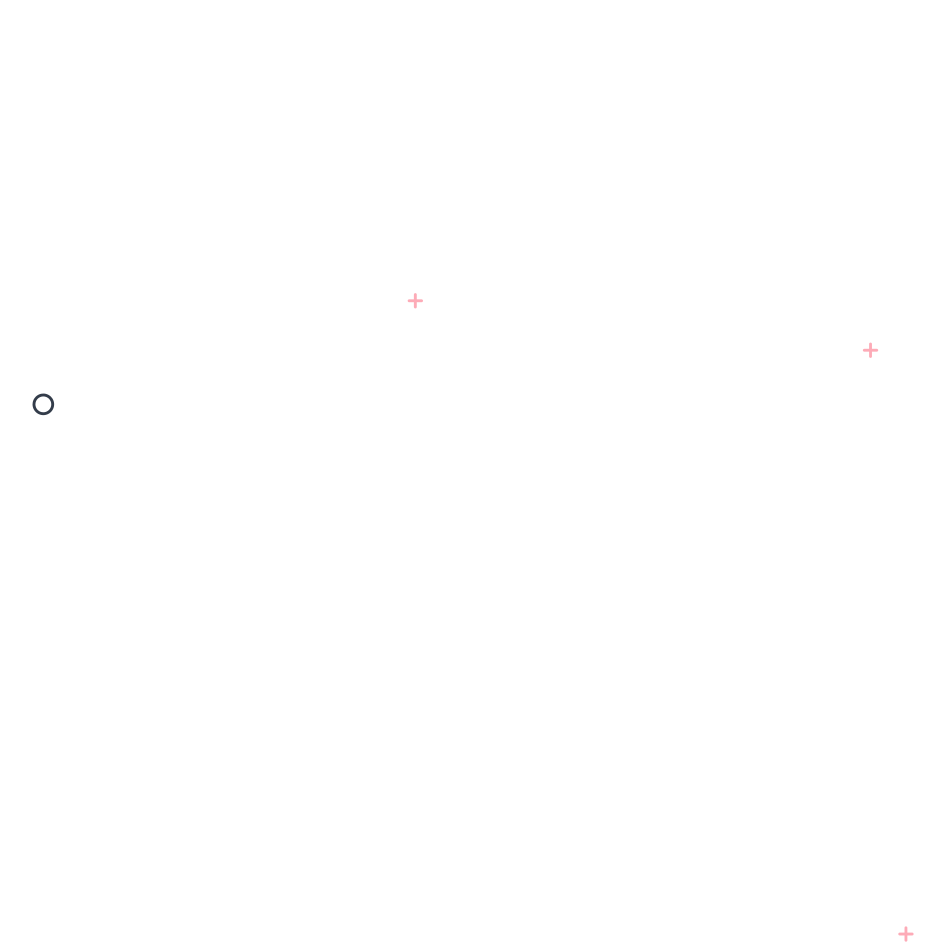You should start cleaning baby teeth when the first tooth erupts, which usually happens when they turn 6 months old. Cleaning infant teeth isn’t easy, though, as every parent who has dealt with a teething baby can tell you. Crying, fussiness, and even a low-grade fever are common for babies before and during their first tooth, but it’s also a sign that you should start thinking about your infant’s tooth care.
Brushing infant teeth requires building trust and a delicate touch, something our team of specialists at Brisbane Paediatric Dentist prides ourselves on. Let us help guide you on when to brush your first milk teeth and the challenges you can expect along the way during this amazing journey.
Key Takeaways
- Start cleaning your baby’s teeth at around 6 months, although children can gain their first tooth between 4 and 7 months old.
- Find a small toothbrush that has soft bristles, a colourful design, and doesn’t irritate your baby.
- Use a fluoride toothpaste that is flavoured with something your baby likes, and avoid additives and irritants.
- It’s important to establish a brushing routine early on. Brush your baby’s teeth at the same time you do to easily remember.
When do you Start Cleaning Baby’s Teeth?
You should aim to start cleaning baby teeth when infants start teething, typically between 4 and 7 months old. However, it’s important to start cleaning your baby’s gums even before they have their first tooth eruption. You can start by cleaning your baby’s gums with a soft, damp cloth or silicone finger brushed with water after feedings.
How to Choose the Right Toothbrush for Your Baby
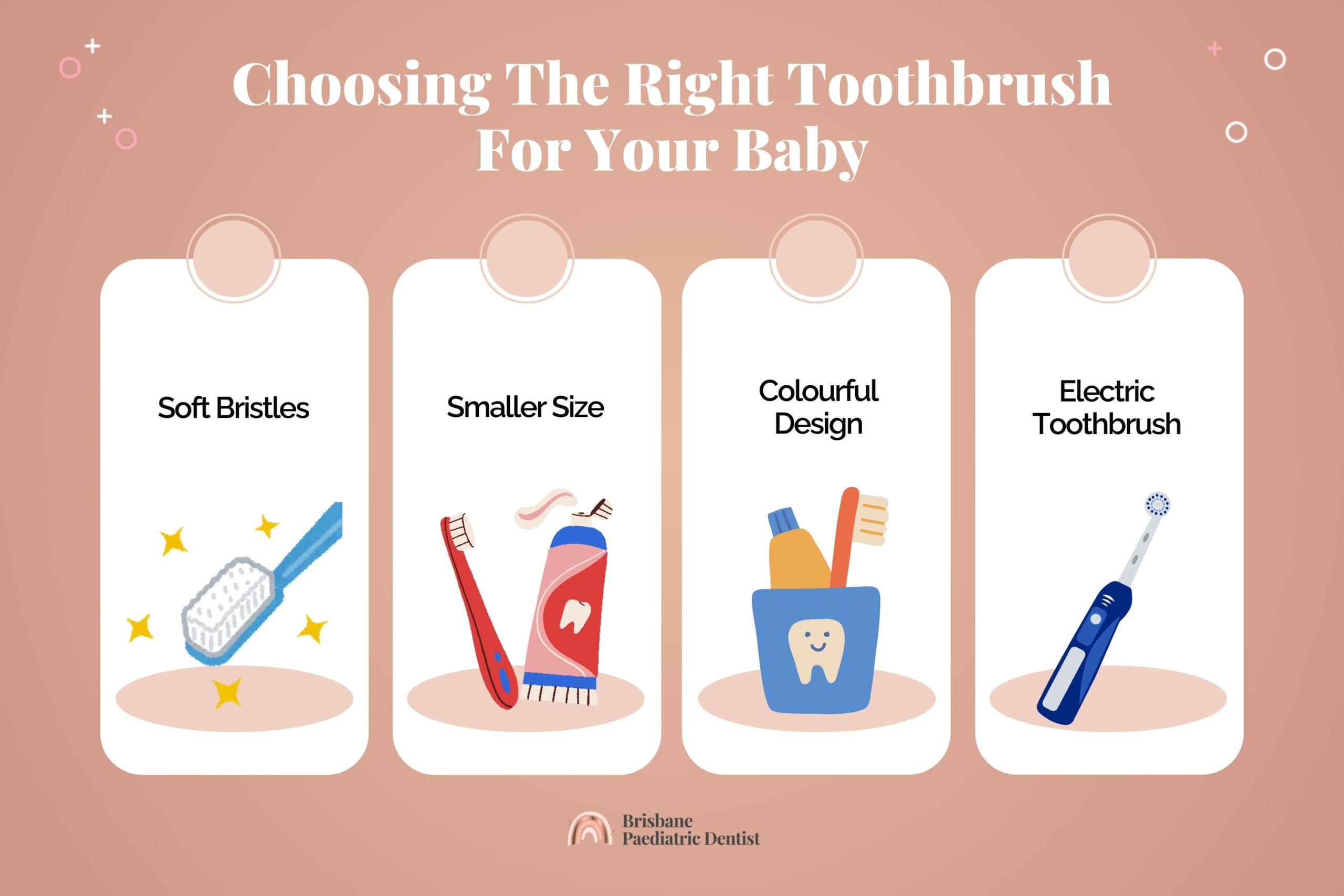
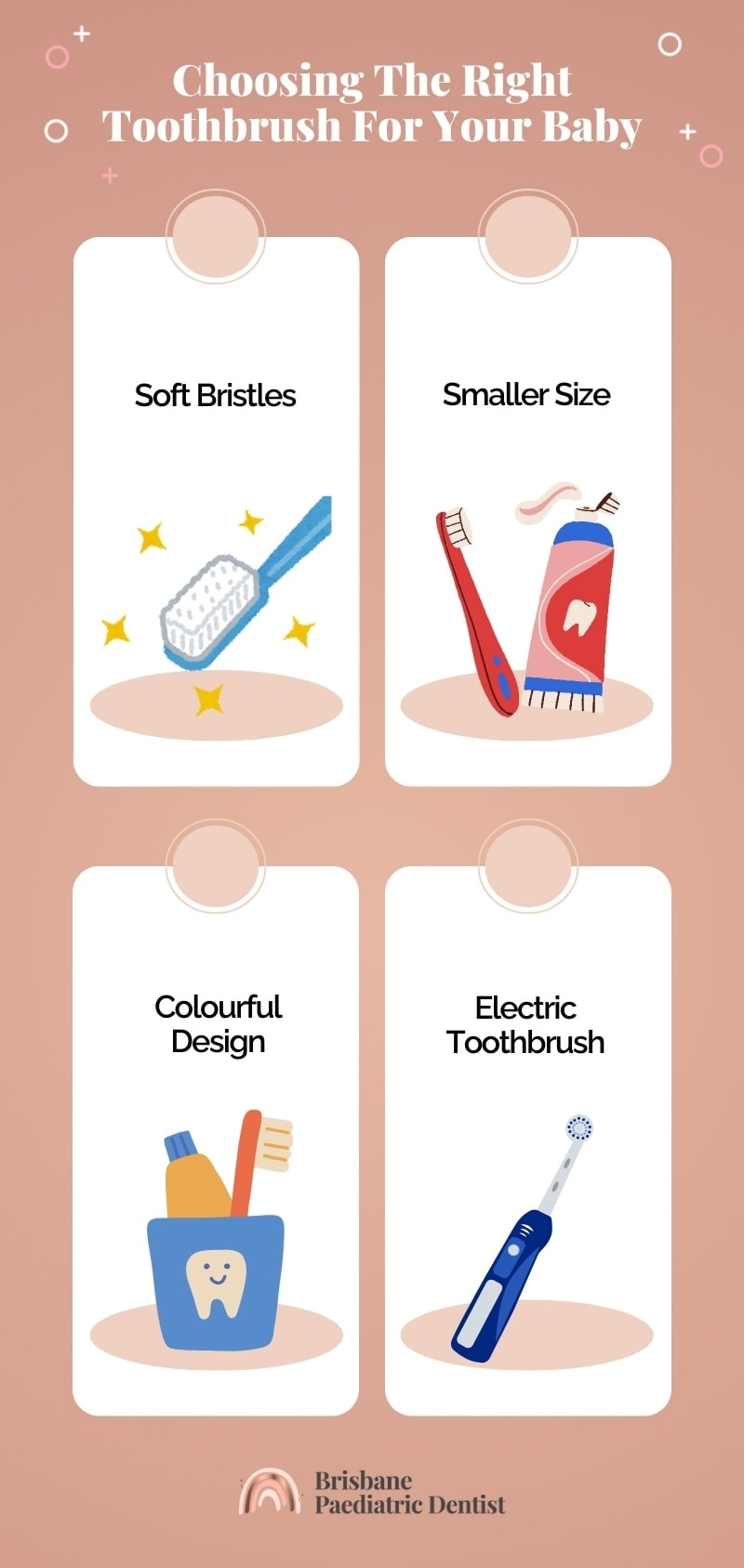
Your baby’s first toothbrush is very important for establishing a good oral hygiene routine early on in their development, as well as for you to get yourself in the routine to start brushing. Some important qualities you want in your baby’s first toothbrush are:
- Soft Bristles. During the first three months, your infant’s teeth can be extraordinarily sensitive. To reduce their irritation (and maybe your own), always aim to purchase a toothbrush with soft bristles that don’t cause irritation or damage.
- Smaller Size. The head of your toothbrush should be small enough to reach the teeth and gums in your baby’s mouth without causing discomfort.
- Colourful Design. Babies love bright colours and fun designs of their favourite cartoon characters (Bluey is always a fan favourite). Not only will it help make the experience of brushing their teeth and care less stressful, they may even enjoy the process.
- Electric Toothbrush. While by no means a deal-breaker, using an electric toothbrush is generally more effective than a manual one. Quality of life features like a brushing timer can make it easier to remember how long you should brush.
When to Start Using Toothpaste for Your Baby’s Teeth
You should immediately pair your first toothbrush with a tube of fluoride toothpaste. Fluoride helps prevent tooth decay, making it a crucial ingredient as soon as the first tooth erupts. Avoid using harsh ingredients like additives or abrasives that increase your baby’s irritation, as your baby may become very upset whenever you try to brush their teeth.
When you buy your first toothpaste, you should try to look for a flavour that your baby loves, like fruit or bubblegum. If they associate brushing with something they like, it will make brushing far easier for you and form healthy habits in the long run.
How to Brush Infant Teeth? Tips for Brushing
When you start brushing baby teeth, it can seem like the world is against you. Thankfully, our team at Brisbane Paediatric Dentist have a step-by-step process that will set you up for success when the first tooth comes knocking.
- Position Your Baby. The easiest way to begin your tooth brushing session is by sitting your baby on your lap with their head resting on your chest. From your angle, you should be able to clearly see your baby’s mouth and have no problem with brushing.
- Toothpaste. Next is preparing the baby’s toothbrush and toothpaste. Up until babies are around three years old, you only need to use a rice grain-sized smear of fluoride toothpaste. Once they’re older than three, you can begin using a pea-sized dollop instead.
- Begin Brushing. Always aim to slowly and gently brush your child’s mouth. Use small circular motions to get all the surfaces clean, paying special attention to their teeth and gums. Brush your child’s teeth from all sides, including the front and back of their first teeth to reduce the risk of tooth decay. Like with adult teeth, you should aim to brush for around two minutes.
- Spitting Out Toothpaste. It’s important to teach your child to spit out their toothpaste after cleaning the surfaces of the teeth. Don’t rinse with water first, as the fluoride that remains after brushing your toddler’s teeth will help protect them. If you notice there is still quite a lot of toothpaste in their mouth, reduce the amount of toothpaste you are using.
You should aim to brush your baby’s teeth twice a day — once in the mornings and once right before bed. Sticking to this routine will help with your baby’s long-term dental care and oral health by stopping plaque from building up in their teeth.
One final tip is to make it fun! No matter how many months of age your baby is when their first tooth appears, turning cleaning your child’s teeth into an enjoyable activity with singing and games will help right from the start. You can even let your baby hold the toothbrush themselves to try to brush their own teeth.
How do you establish a Brushing Routine?
You can establish a brushing routine for your child’s first teeth by beginning early, creating a schedule, being a role model to your child, and holding yourself accountable. When you start brushing your child’s teeth as soon as they come in for the first time, it can be tough to adjust to a new routine. To help your child and yourself take care of your baby’s teeth, it’s important to set up a consistent schedule to follow.
Your own schedule of brushing your teeth in the morning and evening is the perfect time to clean your children’s teeth as well. Keep an alarm or token or reminder where you usually brush your teeth to act as a visual indication that you need to start brushing your baby’s teeth too! As your baby’s next teeth begin to erupt (within the first two years according to teething guidelines), you’ll become a pro in no time.
What are Common Challenges When Brushing Baby’s Teeth?
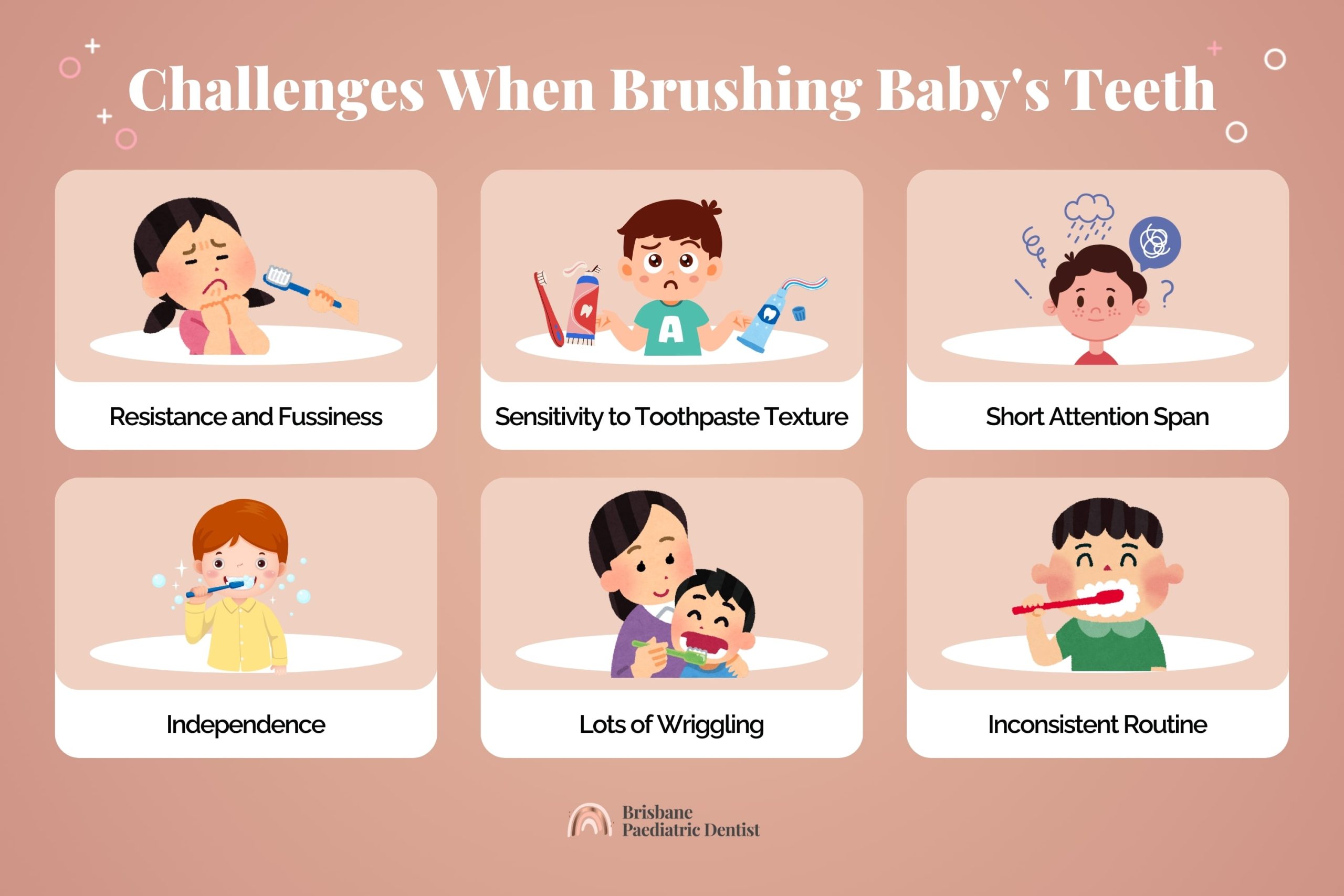
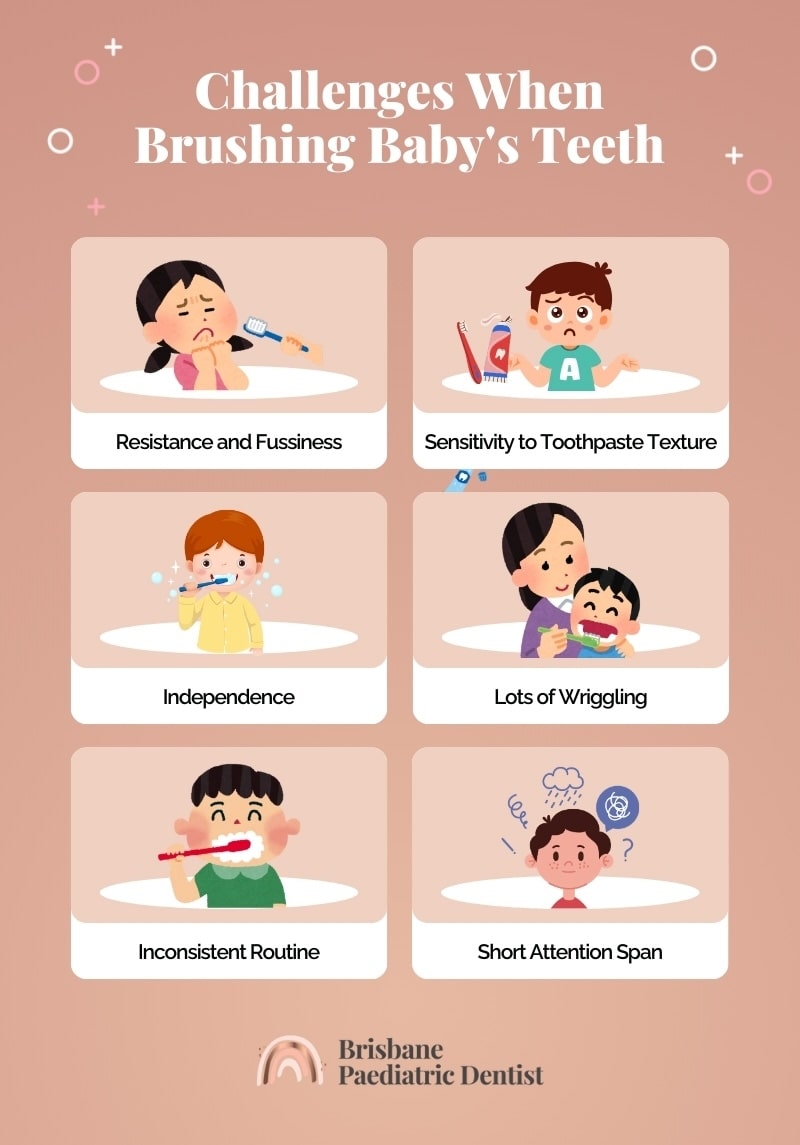
Brushing teeth isn’t always easy. Some common challenges that you can expect to face when brushing your baby’s teeth are:
- Resistance and fussiness
- Sensitivity to toothpaste texture
- Short attention span
- Independence
- Lots of wriggling
- Inconsistent routine
It will take a while for your baby to become used to the routine of brushing their teeth regularly, so don’t be hard on yourself if you can’t brush their teeth when they refuse. This race is a marathon, not a sprint – patience and attentiveness are key.
How to Prepare Your Baby for Their First Dental Visit?
To best prepare your baby for their first dental visit, you should start early. Schedule a visit to your local paediatric dentist for your baby’s teeth as soon as possible. It’ll help them become familiar with the environment of a dental office and prevent any issues from happening down the line.
Whether it’s for a quick dental check-up or a root canal for baby teeth, don’t hesitate to contact Brisbane Paediatric Dentist to provide expert care for tiny smiles. Book your consultation today and experience our top-tier techniques for tiny teeth.
FAQs on When do you Start Cleaning Your Baby’s Teeth?
Should I Brush My Baby’s Gums?
Yes, it’s very important that you brush your baby’s gums along with their teeth. Cleaning the gums plays an important role in preventing bacteria build-up from milk residue, establishing oral hygiene habits, and creating an overall healthy environment for your child’s teeth.
What Should You Do If Your Baby Hates Brushing Its Teeth?
If your baby hates having their teeth brushed, you can always encourage them by offering an incentive or giving them control of the situation. Babies, although small, still strongly value their independence, so it may be a good idea to give them the toothbrush and assist them in brushing their own teeth. Otherwise, you can make brushing their teeth a game or offer them stickers every time they successfully brush their gums and teeth.
Back to Top: When Should You Start Cleaning Your Baby’s Teeth?



